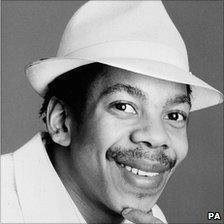No IPCC action over Smiley Culture raid death
- Published

Smiley Culture's singles included Cockney Translation and Police Officer
Police who carried out a raid on the home of reggae singer Smiley Culture which ended in his death will not be disciplined by the police watchdog.
The singer died from a stab wound while in police custody during a raid at his home in Warlingham, Surrey on 15 March.
The family of the singer have called for a public inquiry into his death.
The Independent Police Complaints Commission (IPCC) said the raid was "not satisfactory" but criticism of police did not amount to misconduct.
Smiley Culture - real name David Emmanuel - stabbed himself while making a cup of tea, his family were told.
The IPCC said no fingerprints were found on the hilt of the knife embedded in his chest, but the singer's DNA was present.
In a letter to the singer's nephew, Merlin Emmanuel, Mike Franklin, IPCC commissioner, said: "On this occasion the investigation has identified aspects of the operation which were not satisfactory, and criticism has been made of some of the officers' actions.
"However, these do not meet the threshold for misconduct under the police misconduct system."
The officers can only now be professionally reprimanded if the Met starts an "unsatisfactory performance procedure", which could result in their sacking.
They could also face criminal charges if the commissioner sees evidence of a criminal offence and sends the IPCC's report to the Crown Prosecution Service.
Cocaine trial
But Mr Franklin's letter said the IPCC had "not found any evidence which would suggest any criminal acts were committed by any of the officers in the house".
Smiley Culture's biggest hit was the 1984 song Police Officer, which reached number 12 in the UK charts. His other singles included Cockney Translation and Schooltime Chronicle.
He had been due to face trial accused of conspiracy to supply cocaine.
The IPCC said: "The lead investigator has submitted his report to the IPCC commissioner who must be satisfied that the investigation has met all the objectives set out in the terms of reference agreed at the start.
"The commissioner will ensure that all reasonable lines of enquiry have been examined and may ask for clarification of certain points before he agrees that the report is final.
"Only at this stage will he make the decision about whether or not it should be referred to the CPS."
- Published31 March 2011
- Published24 March 2011
- Published18 March 2011
- Published17 March 2011
- Published15 March 2011